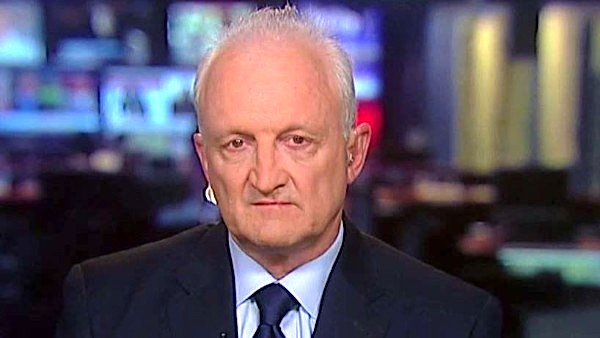

‘Misinformation’ was widely distributed about Philip Haney
By WND Staff
Published February 24, 2020 at 8:08pm
The sheriff’s office in the county near Sacramento where Philip Haney was found dead issued a correction Monday afternoon, saying it has not determined that the Department of Homeland Security whistleblower’s gunshot wound was self-inflicted.
“Unfortunately, there was misinformation immediately being put out that we have determined Mr. Haney’s death to be a suicide. That is not the case,” said a statement from the Amador County Sheriff’s Office.
“We are currently in the beginning phase of our investigation and any final determination as to the cause and manner of Mr. Haney’s death would be extremely premature and inappropriate,” the statement said. “No determination will be made until all evidence is examined and analyzed.”
An initial statement Saturday by the Amador County coroner said deputies and detectives at the scene Friday morning found a firearm near Haney’s body and believed he suffered a single, self-inflicted gunshot wound.
Many of Haney’s friends who had spoken to him in the past week have said he was happy and looking forward to getting married.
Haney, a founding member of DHS, was the co-author, with Art Moore, of the bestseller “See Something, Say Nothing,” which chronicles his repeated conflict with his agency over its politically correct policy of Countering Violent Extremism. The policy was shaped in large part by Islamic supremacists and political appointees who minimize or dismiss the relationship of Islam to terrorism.
In the statement Monday, the sheriff’s office said Haney was found deceased Friday morning in a park-and-ride open area adjacent to State Highway 16 near State Highway 124, less than three miles from where he was living in an RV park in Plymouth, California.
A forensic autopsy will be performed by pathologists from the Sacramento County Coroner’s Office. And the county sheriff has asked the FBI to assist in analyzing documents, phone records and a laptop recovered from the scene and from Haney’s RV.
“We are currently in possession of his vehicle, the firearm located at the scene, and his RV and we will be requesting evidence processing assistance from the FBI on those items as well,” the statement said.
Investigators also conducted a neighborhood canvas and interviewed his RV park neighbors on the day of the incident along with checking key areas for any video surveillance that may exist from that time.
“The investigators are continuing to follow-up with the overwhelming number of persons who are calling our office from throughout the United States asking for detailed information on our investigation,” the statement said.
“This investigation is still active and will be ongoing. No further details will be provided at this time.”
Haney’s remarkable story debuted on the Fox News Channel’s “The Kelly File” in December 2015, shortly after Syed Rizwan Farook and Tashfeen Malik fired automatic weapons at a holiday party in San Bernardino, California, killing 14 people and wounding 21.
Haney explained to Kelly how his case could have prevented the massacre if it had not been shut down.
In June 2016, Haney’s Senate testimony of his agency’s politically correct “purging” of intelligence on terrorist networks in the U.S. caused a stir on Capitol Hill. He told a subcommittee of the Senate Judiciary Committee chaired by Sen. Ted Cruz, R-Texas, that the Obama administration “modified” or eliminated more than 800 of his records related to the Muslim Brotherhood network in the U.S. because they were deemed to be an offense to Muslims.
Two days later, Cruz confronted then-DHS Secretary Jeh Johnson with Haney’s testimony, asking him if it was accurate.
“I have no idea,” Johnson replied. “I don’t know who Mr. Haney is. I wouldn’t know him if he walked in the room.”
“So, you have not investigated whether your department ordered documents to be modified?” Cruz followed up.
“No, I have not taken the time to investigate what Mr. Haney says. No.” Johnson said.
Cruz then asked Johnson if it would concern him if Haney’s testimony was accurate.
“Senator, I find this whole debate to be interesting, but I have to tell you,” Johnson replied, “when I was at the Department of Defense giving the legal sign-off on a lot of drone strikes, I didn’t particularly care whether the baseball card said Islamic extremist or violent extremist. I think this is very interesting, but it makes no difference to me in terms of who we need to go after, who is determined to attack our homeland.
“I think this is all very interesting, makes for good political debate,” he continued, “but in practical terms, if we, in our efforts, here in the homeland, start giving the Islamic State the credence that they want, to be referred to as part of Islam, or some form of Islam, we get nowhere in our efforts to build bridges with Muslim communities.”
Two days before Cruz quizzed Johnson, the senator chaired a hearing titled “Willful Blindness: Consequences of Agency Efforts to Deemphasize Radical Islam in Combating Terrorism.”
In his first opportunity to ask questions, Cruz told Haney his testimony before the committee was “exceptionally important.”
“I commend both members of the media and the American public to examine your testimony closely, because you have described a systematic policy, indeed of scrubbing, sanitizing, erasing references to radical Islam,” Cruz told the recently retired DHS officer.
See video of C-Span’s coverage the “Willful Blindness” Senate hearing June 28, 2016
In addition, Haney said, a highly successful case he helped develop as a member of one of the National Targeting Center’s advanced units was shut down by Hillary Clinton’s State Department and the DHS Office of Civil Rights and Civil Liberties out of concern for the “rights” of foreign Muslims. And after Haney retired honorably in 2015, he discovered that had his case continued, it might have prevented both the Orlando and the San Bernardino attacks.
Along with the quashing of the case in June 2012, the administration subsequently ordered the deletion of an additional 67 records concerning a related network.
